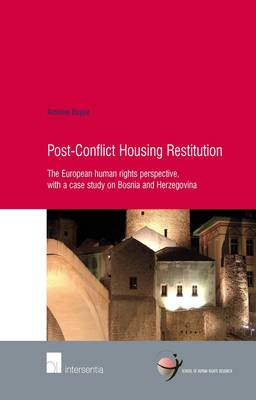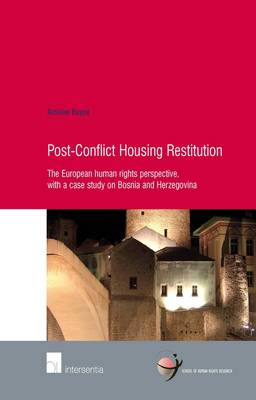
- Afhalen na 1 uur in een winkel met voorraad
- Gratis thuislevering in België vanaf € 30
- Ruim aanbod met 7 miljoen producten
- Afhalen na 1 uur in een winkel met voorraad
- Gratis thuislevering in België vanaf € 30
- Ruim aanbod met 7 miljoen producten
Zoeken
Post-Conflict Housing Restitution
The European Human Rights Perspective, with a Case Study on Bosnia and Herzegovina Volume 25
Antoine Buyse
€ 79,00
+ 158 punten
Omschrijving
Awarded with the Erasmus Research Prize 2008 and the Max Van der Stoel Human Rights Award 2008
The loss of one's house is often one of the most dramatic personal consequences of armed conflict. In fragile post-conflict societies such a loss does not only cause a flow of refugees and other displaced persons, but it can also be a source of renewed conflict. Restitution of housing could help to solve these problems and thus help to attain peace and to rebuild the rule of law. This study focuses on the legal aspects of restitution. Its purpose is to identify the stumbling blocks which in many cases hamper restitution. Thus, the main research question is how the right to housing and property restitution for refugees and other displaced persons can be secured more effectively in European post-conflict situations.The study is structured around three requirements for the effectiveness of a legal norm: its normative clarity, the operational framework which supports the norm, and the political will or consensus, among the main actors involved, to implement the norm. Throughout, the main perspective is the European Convention on Human Rights within the broader context of public international law and human rights law. First, the issue of the existence and content of a right to housing restitution is elaborated upon. Secondly, specific challenges in the institutional sphere are addressed. Thirdly, the research focuses on the application of housing restitution in practice, by way of a case study. It analyses how restitution was implemented in Bosnia and Herzegovina in the wake of the 1995 Dayton Peace Agreement. The study concludes with a set of specific recommendations for the effective implementation of the right to housing restitution in post-conflict states.
About this book:
'[...] the study is a definitive must [...]. A perfect balance between theory and practice.'
Christine Janssens and Asja Serdarevic in Human Rights & International Legals Discourse 2009 (119). '[...] a very meaningful contribution to the global debate on restitution [...]. [...] a very worthy work and one that should be read by everyone within the Global Restitution Movement [... ].'
Scott Leckie in the Netherlands Quarterly of Human Rights 2010 (137). '[...] a valuable contribution to the transitional justice canon. [...] and in ways too numerous to capture here, [it] advances the conversation in significant ways and expands the promise of reparations as tools of justice.'
David Gray in the International Journal of Transitional Justice 2010 (296.
Specificaties
Betrokkenen
- Auteur(s):
- Uitgeverij:
Inhoud
- Aantal bladzijden:
- 440
- Taal:
- Engels
- Reeks:
Eigenschappen
- Productcode (EAN):
- 9789050957700
- Verschijningsdatum:
- 21/02/2008
- Uitvoering:
- Paperback
- Formaat:
- Trade paperback (VS)
- Afmetingen:
- 170 mm x 240 mm
- Gewicht:
- 748 g

Alleen bij Standaard Boekhandel
+ 158 punten op je klantenkaart van Standaard Boekhandel
Beoordelingen
We publiceren alleen reviews die voldoen aan de voorwaarden voor reviews. Bekijk onze voorwaarden voor reviews.











